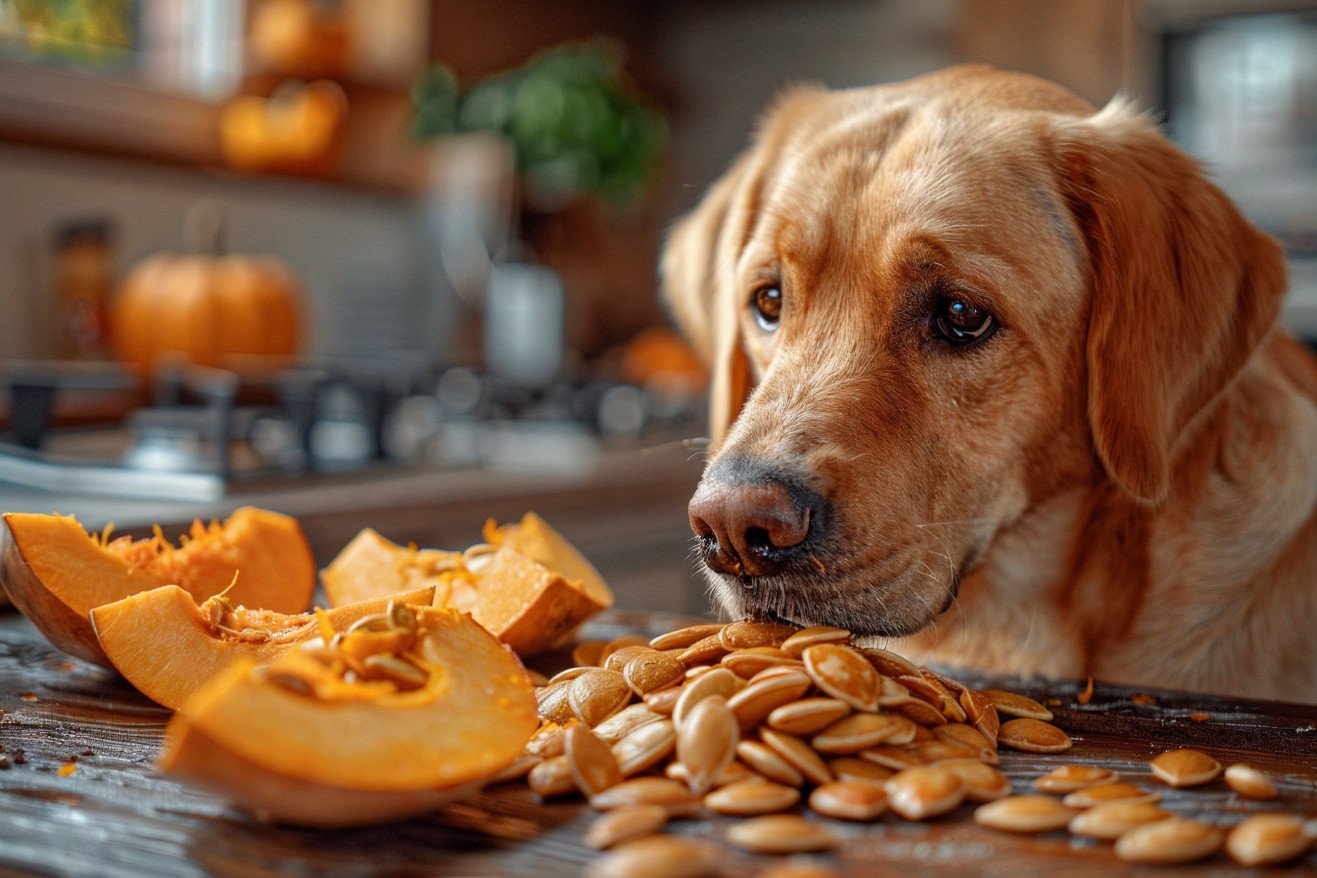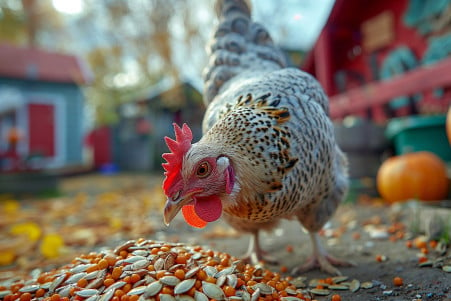Can Dogs Eat Pumpkin Seeds? Pros and Cons
14 April 2024 • Updated 13 April 2024

If you've ever carved a pumpkin, you've probably wondered if the seeds are safe to share with your dog. While pumpkin seeds are full of healthy nutrients like antioxidants, magnesium, and zinc that can benefit your dog's well-being, they're also high in fat, which means they should be given in moderation and as an occasional treat.
To get to the bottom of this, we've looked at studies and referenced veterinarians and pet nutrition experts. They've shared insights into how many pumpkin seeds dogs can eat, the potential downsides of feeding them to your dog, and the best ways to give your dog pumpkin seeds. By the time you're done reading, you'll know everything you need to know to decide if you want to add pumpkin seeds to your dog's treat menu.
Are pumpkin seeds good for dogs?
Nutritional Value and Health Benefits of Pumpkin Seeds for Dogs
Pumpkin seeds are a nutrient powerhouse, providing a wide range of vitamins, minerals, healthy fats, and antioxidants that can support your dog's health in many ways. According to The Farmer's Dog, pumpkin seeds are high in fiber, protein, magnesium, zinc, iron, and antioxidants.
The fiber in pumpkin seeds can help with digestion and bowel regularity, which can be especially helpful if your dog is dealing with constipation or diarrhea. As Bella and Duke points out, pumpkin seeds are also a good source of omega-3 and omega-6 fatty acids, which can benefit your dog's skin and coat, making their fur look shiny and feel soft.
Pumpkin seeds are even thought to have anti-inflammatory and immune-boosting effects. Nom Nom explains that the vitamins and minerals in pumpkin seeds, including vitamin E, zinc, and iron, have anti-inflammatory and immune-supporting properties.
What's more, some studies have shown that pumpkin seeds can help eliminate intestinal parasites in dogs. According to The Farmer's Dog, pumpkin seeds contain compounds that may help expel intestinal worms, such as tapeworms and roundworms, from a dog's body, although more research is needed to confirm this potential benefit.
Given the many nutrients and potential health-promoting properties of pumpkin seeds, they can be a great addition to your dog's diet. However, it's important to consider serving sizes and potential downsides, which we'll cover in the next section.
Potential Dangers and How to Safely Feed Pumpkin Seeds to Dogs
While pumpkin seeds can be a safe and healthy snack for dogs, some dogs may have allergies or sensitivities to them. According to Wagwalking.com, signs of a pumpkin allergy in dogs may include skin problems, digestive issues, and even respiratory problems such as coughing and wheezing.
Feeding your dog too many pumpkin seeds can also lead to issues. RexiPets warns that overconsumption can result in weight gain, pancreatitis, and other digestive issues, as a dog's body may not be able to process the high fiber and fat content as efficiently as a human's. The shells of pumpkin seeds can also be a choking hazard, especially for small dogs.
To avoid these dangers, Raised Right suggests removing the shells before giving pumpkin seeds to dogs. It's also important to start with small amounts and watch for any negative side effects. Your vet can help you determine how many pumpkin seeds your dog can eat based on their size and other factors.
How to Make Pumpkin Seeds Safe and Healthy for Dogs
Purina warns that dogs may have difficulty digesting raw pumpkin seeds and should not be given them at all (via Purina). Instead, the best option for dogs is cooked or roasted pumpkin seeds that are free of salt, oil, and spices (via Furtropolis). Furtropolis also suggests taking the seeds out of their hard shells, which can be a choking hazard and make the seeds less digestible.
To make pumpkin seeds even more digestible, you can grind or crush them to a powder or paste, making them easier to mix with your dog’s food, according to USA Today. Veterinarian Diana Watkins explains that dogs don’t digest pumpkin seed shells well, so this can help prevent gastrointestinal problems.
Whichever way you choose to prepare pumpkin seeds for your dog, it’s important to introduce them slowly and watch for any negative side effects, according to Purina. With the right preparation and portion sizes, pumpkin seeds can be a safe and delicious treat for your dog.
How Much Pumpkin Seed Should You Feed Your Dog?
The amount of pumpkin seeds you can feed your dog will depend on their size. According to The Honest Kitchen, small dogs can have 1/4 teaspoon or 3-5 seeds per day, medium dogs can have 5-10 seeds, and large dogs can have 10-20 seeds. Feeding your dog more than this can cause digestive issues like an upset stomach, constipation, or diarrhea.
According to Scary Mommy, other signs of overfeeding your dog pumpkin seeds include weight gain, lethargy, and potential pancreatitis. Make sure to watch your dog closely after you feed them pumpkin seeds and adjust the amount you give them as needed. Dr. Paola Cuevas also suggests feeding your dog pumpkin seeds in smaller amounts throughout the day instead of all at once.
As long as you're careful to stick to the recommended amounts, pumpkin seeds can be a healthy treat for your dog. Just make sure to watch for any signs of an adverse reaction. In moderation, pumpkin seeds can be a great way to add some extra nutrients to your dog's diet.
Pumpkin Seeds to Naturally Deworm Your Dog
Pumpkin seeds have been found to contain cucurbitin, an amino acid that can paralyze and expel intestinal worms from dogs, according to PetPartners Pet Insurance. In fact, research has demonstrated that pumpkin seeds can be effective against a variety of worms, including tapeworms and roundworms. Dogs Naturally explains that the recommended deworming dose is approximately 1/2 teaspoon of ground pumpkin seeds per 20 lbs of body weight, and it should be administered once or twice a day until the worms are gone.
That said, it’s important to talk to your vet before using pumpkin seeds as a dewormer since, as Whoa Nelly! Raw Dog Food points out, their efficacy can vary based on a number of factors, including the type of worms your dog has and the amount of cucurbitin in the pumpkin seeds. That said, when used under the supervision of a vet and in the right amounts, pumpkin seeds can be a safe and natural way to help your dog get over an intestinal parasite infection.
Conclusion: How to Add Pumpkin Seeds to Your Dog's Diet
While pumpkin seeds can be a healthy and nutritious snack for dogs, it's important to remember that there are potential downsides to feeding them to your pet. As noted by Daily Paws, pumpkin seeds are not easily digestible for dogs, and feeding them in large amounts can lead to an upset stomach or other digestive issues.
That said, Pride+Groom explains that pumpkin seeds are full of fiber, protein, and essential minerals that can help support a dog's overall health, including their bladder, digestive health, and skin and coat health. The key is to feed them in moderation, with the recommended serving size ranging from 1/4 teaspoon to 10-20 seeds per day, depending on the size of the dog.
BeChewy warns that while pumpkin seeds are safe for dogs, they don't offer the same health benefits to dogs that they do to humans. Dogs' digestive systems don't absorb the nutrients in pumpkin seeds as well as humans' digestive systems do. Furthermore, the idea that pumpkin seeds can act as a natural dewormer is a myth, as they may only cause diarrhea that expels worms, rather than addressing the root cause of the infestation.
To make sure that pumpkin seeds are safe for your dog to eat, it's important to remove the shells, roast or grind the seeds, and watch for any signs of an adverse reaction. It's also a good idea to talk to a vet before you start giving your dog pumpkin seeds or using them to deworm your pet.


